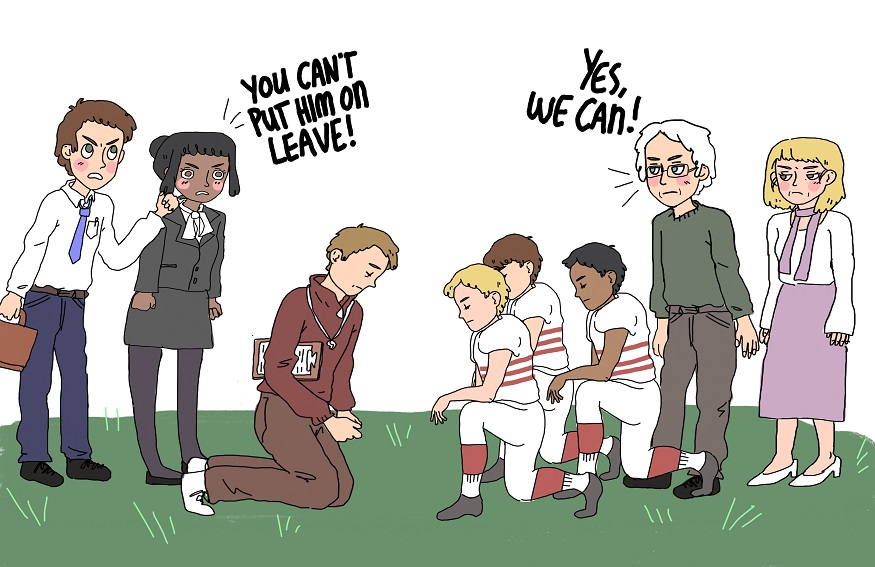Christians Should Not Expect Special Treatment
Bremerton High School football coach Joe Kennedy has come under fire recently due to his postgame, on-field group prayers. Since all requests to desist this practice have been ignored, Bremerton School District has placed Kennedy on administrative leave.
Political candidates and religious groups have jumped on the opportunity to decry Kennedy’s suspension as a violation of religious rights. Ben Carson and Donald Trump have both tweeted support for Kennedy. The Liberty Institute, a legal organization dedicated to defending religious rights in America, has even agreed to represent him in court.
I do not know if Carson or Trump will be America’s next president. But I do know that the Liberty Institute will not win their case. They claim that Kennedy’s right to a reasonable request for religious accommodation—granted under Title VII of the Civil Rights Act—was violated. But leading a group prayer with minors on state-owned property is not a reasonable request. It is illegal and has been for a long time. The fundamental question is: should it be?
Yes.
While religion does seems downright demonized in some places, insisting that group prayer not be conducted on school property with minors is not a “war against God.” The purpose of the establishment clause of the First Amendment is to produce stability through harmony by neither persecuting nor prioritizing any one religion over another. This necessitates that government-run establishments be conducted in a strictly secular manner. Nevertheless, the United States government has a long history of indicating its religious nature. Our politicians frequently mention God, our currency mentions God, and until recently, students were required to recite the Pledge of Allegiance in schools, which claims that the U.S. is one nation under God.
With few people to oppose, contradictions such as these have been willingly overlooked. But the Christian supermajority in America is steadily declining. According to a survey conducted by the Pew Research Center in May of this year, those who identify as Christian have declined by 7.8% in the past seven years while those who identify with a non-Christian faith have increased by 1.2%. This means that Christian-specific dogma might alienate an increasing percentage of the population whose religions are not centered on Jesus Christ. Importantly, however, those who claim no religion (atheist, agnostic, or “nothing in particular”) has risen the fastest in the nation, increasing by 6.7%. In their case, any religious dogma at all is likely to make them feel uncomfortable and out of place.
I understand what Coach Kennedy and his team gain from these prayers: unity, humility, contemplation, inspiration. But suppose that one player is non-Christian, is questioning his faith, or has simply decided that he does not believe. A coach-led group prayer will put this boy in one of three positions. He can silently pray to the God of his choosing—unbeknownst to the coach, of course; he can pretend that his faith is of equal strength as everyone else’s for the sake of fitting in; or he can exclude himself from the group prayer — possibly upsetting his coach and certainly ostracizing himself socially. None of these options is fair to a young boy who simply wants to play some football.
In an interview with Kiro 7 News, Kennedy remarked, “It crushes me not to be down there, you know, you’re not with them to give them a hug.” It would be so simple for Kennedy to maintain all the benefits of his group prayers without breaking the law and assuming religious belief. He could still gather his team (unity), have them kneel and bow their heads (humility), become quiet (contemplation), and deliver a message about determination, optimism, and diligence (inspiration). All Kennedy needs to do to continue to lead his team is to keep his faith personal in this particular setting. He has refused to do so.
The Liberty Institute, as well as Carson and Trump, are using this situation to further the idea that Christians are unfairly persecuted in the United States. This message will surely resonate with the 70% that still claim a Christ-based religion. But a Jewish coach reading a prayer from a siddur would lead to many a Christian-parent complaint. A Muslim coach leading an Islamic prayer would likely incite a riot. Being in the majority does not grant Christianity an exemption from the law. Nor does it give Christians the right to receive preferential treatment. While the coach’s heart is in the right place, his seat on the sidelines is justified.






